A Gambian bus carrying many cross-border traders to Dakar, Senegal, was stopped and turned around by competing transport unionists at the border of Karrang. The bus had all the necessary licenses, but local border officials and police were not able to facilitate its passage.
This was a recurring issue that seriously affected many small and informal traders whose livelihoods depend on selling their goods in Dakar.
On behalf of the traders and the bus company, the Gambian Chamber of Commerce and Industry submitted a complaint on the UNCTAD-supported non-tariff barriers (NTBs) online reporting, monitoring and eliminating mechanism of the African Continental Free Trade Area (AfCFTA) at tradebarriers.africa.
Reporting the barrier on the online mechanism brought it from the shadows to the limelight. National focal points of the Gambia and Senegal engaged in a series of consultations and negotiations among stakeholders at the national level and bilaterally.
The issue was ultimately brought to the biannual presidential council meeting, where the presidents of the Gambia and Senegal made a joint declaration to resolve the reported NTB. Ministerial committee and expert committee meetings agreed and signed a detailed transport accord.
With the opening of borders on 1 April 2021, after COVID-19-related closures, buses resumed their regular services from the Gambia to Senegal without any incidents. After further consultations with concerned stakeholders, the NTB was officially declared resolved.

A $20 billion-a-year opportunity
An UNCTAD report estimates that addressing NTBs like these across Africa can bring gains of $20 billion each year to AfCFTA member states/state parties. This is three to four times more than the gains expected from eliminating intra-African tariffs.
UNCTAD supported the African Union (AU) in developing the new NTB online mechanism. Based on an AfCFTA annex on NTBs and building on experiences from regional economic communities, UNCTAD developed a draft website.
AU member states oversaw the process in the context of the formal AfCFTA negotiating structures. Technical experts, chief negotiators, senior trade officials and ministers scrutinized the website a dozen times during the negotiations. Heads of state adopted and launched the website at the 12th Extraordinary Summit of the AU.
The key feature of the mechanism is that it’s open to the private sector. Anyone can register and report an NTB they encounter – anywhere on the African continent.
The online mechanism can be used by micro, small and medium-sized companies, informal traders, youth and women business operators. It gives an equal voice to all stakeholders, small or large. After a one-minute online registration process, a user can log in and submit their complaint.
To resolve NTBs, governments have appointed national focal points. They receive NTB complaints in real time and are mandated under the AfCFTA to resolve the barriers reported within set deadlines. Communication and exchange of relevant documents is facilitated through the online mechanism.
UNCTAD and the AU organized several physical and virtual workshops to train the officials in the use of the online tool – and UNCTAD delivers one-on-one support where needed.
UNCTAD is also working with the AfCFTA Secretariat and member states/state parties to raise awareness on this new opportunity for African traders. Over 5,000 stakeholders were reached by the end of 2021, while the website had been visited 27,000 times.
The key strengths of the NTB online mechanism are its solid legal basis in the AfCFTA agreement and its ownership by the AU and the AfCFTA Secretariat. This ensures long-term sustainability.
Preventing new non-tariff barriers

In addition to helping in the identification and elimination of existing barriers, UNCTAD also works to prevent new NTBs. Since many of them arise from the lack of transparency on trade rules, UNCTAD is working with 17 AfCFTA member states/state parties to increase access to trade-related regulations.
The effort is part of the UNCTAD Global Transparency Initiative that already covers over 100 countries and 90% of world trade. Through the initiative, over 800 regulatory texts were collected in Africa and 650 participants received capacity-building support in data collection and good regulatory practices through 64 meetings in 17 countries.
The regulatory information is processed into a database format so that exporters, importers and policymakers can easily search for applicable product requirements. The data is freely available on the newly launched UNCTAD TRAINS database.
UNCTAD also shares the data with the Global Trade Helpdesk. The multi-agency initiative co-led with the International Trade Centre and the World Trade Organization aims to simplify market research for companies, especially micro, small and medium enterprises (MSMEs), by integrating trade and business information into a single online portal.
UNCTAD’s AfCFTA support programme to eliminate non-tariff barriers, increase regulatory transparency and promote industrial diversification is financed by Germany. The first phase of the project, conducted between 2018 and 2020, was independently evaluated, earning the top grade with the citation “Strong achievement across the board”. Phase two is ongoing.
More on non-tariff measures (NTMs)


